

11 Superpowers of Kids with ADHD. So, you’ve been told that you’re easily distracted, impulsive, restless, and even hyperactive?
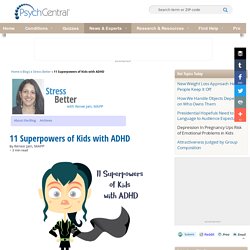
You might have been told you have ADHD, which stands for attention deficit hyperactivity disorder. You are not alone. In fact, 1 in 10 of your classmates might be going through the same experience as you. Of course, ADHD may get in the way of everyday things you want to do such as sitting still, or following through on something, or focusing for long periods… but guess what? There are not only things you can do to work your challenges, there are some awesome superpowers that come with ADHD. 1. More and more, the world around us is realizing that old ways of thinking might need to be updated. 2. The National Institute of Mental Health says that hyperactivity is a major part of ADHD. 3. Your brain is wired a little differently than most, and creative, innovative thinking comes naturally to you. 4.
You might feel like your mind sometimes works like a pinball—bouncing around from point to point. Mindful Parenting for ADHD: An Interview with Dr. Mark Bertin. One things we know about parenting is that while it can be incredibly rewarding at times, at other times it can be extremely challenging.
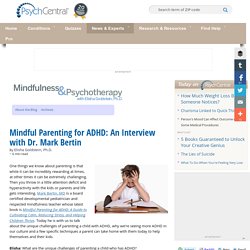
Then you throw in a little attention deficit and hyperactivity with the kids or parents and life gets interesting. Mark Bertin, MD is a board certified developmental pediatrician and respected mindfulness teacher whose latest book is Mindful Parenting for ADHD: A Guide to Cultivating Calm, Reducing Stress, and Helping Children Thrive . Today he is with us to talk about the unique challenges of parenting a child with ADHD, why we’re seeing more ADHD in our culture and a few specific techniques a parent can take home with them today to help themselves and their kids. Elisha: What are the unique challenges of parenting a child who has ADHD?
ADHD & Adults: 4 Things that Cause Overwhelm and What You Can Do. When you have ADHD, many things can cause you to feel overwhelmed.
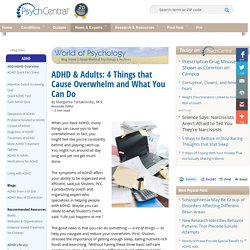
In fact, you might feel like you’re constantly behind and playing catch-up. You might run around all day long and yet not get much done. The symptoms of ADHD affect your ability to be organized and efficient, said Juli Shulem, PCC, a productivity coach and organizing expert who specializes in helping people with ADHD. Maybe you can relate to what Shulem’s client said: “Life just happens at me.”
The good news is that you can do something — a lot of things — to help you navigate and reduce your overwhelm. ADHD & Adults: 5 More Things that Make You Feel Overwhelmed and Tips to Help. When you have ADHD, it’s easy to feel overwhelmed.
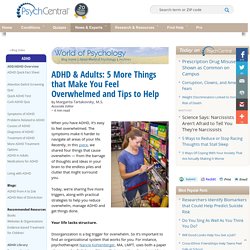
The symptoms make it harder to navigate all areas of your life. Recently, in this piece, we shared four things that cause overwhelm — from the barrage of thoughts and ideas in your brain to the endless piles and clutter that might surround you. Today, we’re sharing five more triggers, along with practical strategies to help you reduce overwhelm, manage ADHD and get things done. Your life lacks structure. Disorganization is a big trigger for overwhelm. Analeptic. Research shows that students with ADHD can concentrate better when they’re allowed to fidget (here's a link to the study).
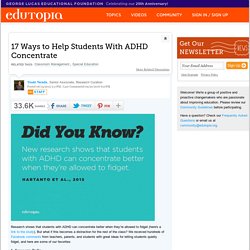
But what if this becomes a distraction for the rest of the class? We received hundreds of Facebook comments from teachers, parents, and students with great ideas for letting students quietly fidget, and here are some of our favorites: 1. Squeeze Balls Squishy balls, stress balls, koosh balls, hand exercisers… there are dozens of objects that can be squeezed quietly. 2. Fidgets are small objects that help keep students’ hands occupied. 3. Silly putty, playdough, or sticky tack can also keep students' hands occupied. 4. Tape a strip of the hard side of velcro under the student’s desk.
4 Strategies for Staying Motivated With ADHD. Because of how science works, researchers usually name disorders before they understand them.
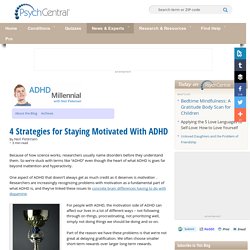
So we’re stuck with terms like “ADHD” even though the heart of what ADHD is goes far beyond inattention and hyperactivity. One aspect of ADHD that doesn’t always get as much credit as it deserves is motivation. Researchers are increasingly recognizing problems with motivation as a fundamental part of what ADHD is, and they’ve linked these issues to concrete brain differences having to do with dopamine. Rewards! Got ADHD? The Answer May Not Be What You Think.
ADHD is commonly understood as difficulty sustaining attention, disregarding irrelevant stimuli, and organizing information toward goal directed behavior, and in many cases, reduced motivation, and somewhat unsurprisingly, it’s rates have experienced a dramatic upward trajectory in the last decade.
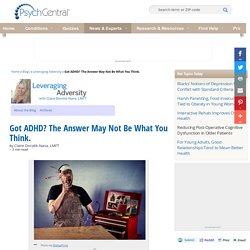
But while we may point to our Smartphones, ipads, and our addiction to them (which although not recognized by the DSM 5, for many falls under the long recognized construct of technology addiction), some researchers argue that the problem of ADHD may just have more to do not with our addictions themselves but the way they hijack our dopamine reward system. See more about this here. The results showed something interesting: it wasn’t just that ADHD patients had lower levels of dopamine receptors and transporters, it was that they showed up in the accumbens and midbrain – two key regions of the brain directly involved in processing motivation and reward.
Abnormal responses to reward. References: Finding Focus: How to Take Control of ADHD with Evernote. October is ADHD (Attention Deficit/Hyperactivity Disorder) Awareness Month.
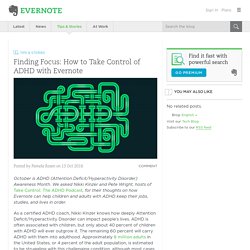
We asked Nikki Kinzer and Pete Wright, hosts of Take Control: The ADHD Podcast, for their thoughts on how Evernote can help children and adults with ADHD keep their jobs, studies, and lives in order. As a certified ADHD coach, Nikki Kinzer knows how deeply Attention Deficit/Hyperactivity Disorder can impact people’s lives. ADHD is often associated with children, but only about 40 percent of children with ADHD will ever outgrow it. The remaining 60 percent will carry ADHD with them into adulthood. Approximately 8 million adults in the United States, or 4 percent of the adult population, is estimated to be struggling with this challenging condition, although most cases are undiagnosed.
The stakes are high. The ADHD Brain in College But the news isn’t all bad. Nikki Kinzer. Attention Balance.